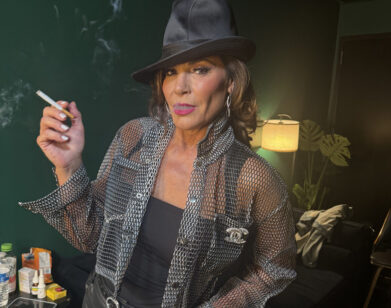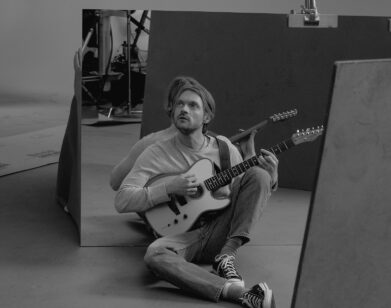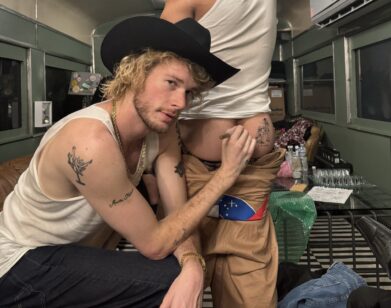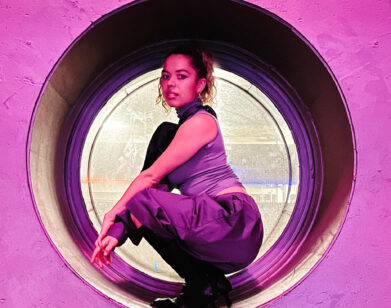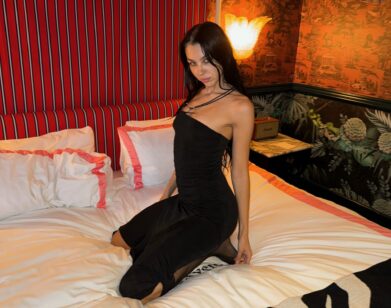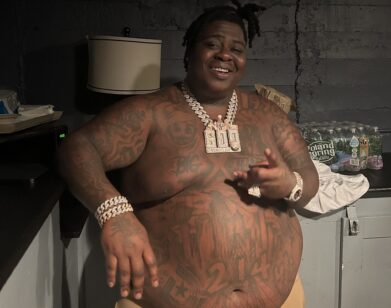D.A. & the Supa Dups Create Their Own Rhythm Nation
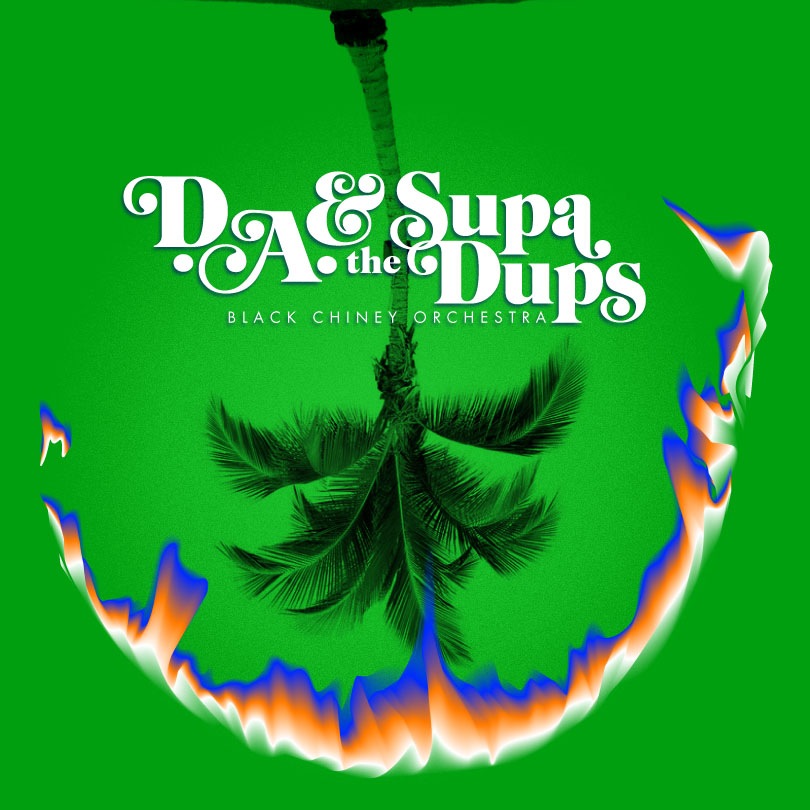
What do you get when you combine dancehall, reggae and retro-pop rock (think early Beach Boys)? D.A. Wallach, of the much-hyped Harvard group Chester French (otherwise known as those two white dudes signed to Pharrell’s label, Star Trak), is attempting to answer that question with his newest project, D.A. & the Supa Dups.
“The Supa Dups” is not a trio of doo-wop singers, but rather a single man; and if anyone warrants a “the” prefix for his name, it’s Dups. You may not know him by name, but you’ve certainly heard the Jamaican-born, Miami-based, Grammy-winning producer’s beats, provided you’ve ever listened to Rihanna, Akon, Estelle, John Legend, Bruno Mars, Eminem, or Drake.
Dups and D.A. have only released two songs so far, the wistful “Who Do You Know” and the reggae-beat heavy “Too Cool,” featuring Vybz Kartel. We chatted with the jovial pair about crocks, Disneyland, and what we can expect from their collaborative experiment.
EMMA BROWN: Hi, it’s Emma.
SUPA DUPS: How are you doing, Emma?
BROWN: I’m doing well. Where in the world are you right now?
DUPS: I’m at home, I’m in Miami. I just came back fresh from Disneyland with my family. Ever been there?
BROWN: No, never. I’ve only ever been to Euro Disney in Paris, although I’m sure it’s nothing compared to the one Florida.
DUPS: Disneyland is huge, so my legs are killing me. I got introduced to Crocs over there, so I’m wearing Crocs right now. [laughs] You know, the ugly slippers. I bought a pair. They have Mickey Mouse ears on them.
D.A. WALLACH: Emma? I’m so sorry I’m late, is Supa Dups there?
DUPS: No.
WALLACH: I’m sorry to keep you guys waiting.

BROWN: No worries.
WALLACH: So what can we tell you?
BROWN: How did this collaboration come about?
WALLACH: Well, Supa Dups was doing some work in a studio in LA, a little over a year ago, and I was just a huge fan of the work he did for John Legend and Estelle. I knew those records, but I didn’t know that it was one guy who had made them. When I found out from a friend that it was all one guy named Supa Dups I was like, “Wow, I’ve got to meet this guy.”
DUPS: [laughs] Like the only other person…
WALLACH: I swear it’s true. I went over to his studio and found this Chinese-Jamaican guy who has the heaviest roots-reggae type beats that I’ve ever heard and we just started writing a bunch of songs. We finished, like, four songs in three days.
DUPS: At first it wasn’t even supposed to be about D.A. and Supa Dups, it was just D.A. coming in for some writing sessions, but then it sounded so good that we were like “Yo, let’s just do that thing.”
BROWN: Do you have a plan for where this project is going, or are you just taking it as it comes?
WALLACH: We’re just having fun, we’re making as many records as we can within our respectively busy schedules. We’ve got more than an album’s worth of music already and we’re just figuring out how we can continue to milk the creative energy. We’re definitely going to put out more songs, but when you’re introducing people to a new project, you gotta take it slow and let people talk about the songs and fall in love with the songs. We’re just starting the process.
DUPS: We’re not gonna shove it down people’s throat. [laughs]
BROWN: Are you thinking of releasing it as an album?
WALLACH: Oh, yeah. We’ve just got to feel when the time is right. I think we’re at a moment in history where all the rules are out the window; it’s not about “Here’s a single, and then let it build for a couple of months and then put out an album.” We’re having fun thinking about how we can improvise and make it fun for people to be fans of the music.
BROWN: Yes, you’re very communicative with your fans via Twitter.
WALLACH: Yeah, and Dups is too.
DUPS: He’s got way more people than me though, probably 994,000 more people than I do. [laughs]
BROWN: It sounds like the songwriting came pretty easily while you were together.
DUPS: Yes, it was very natural. He and I are from two very different worlds, and combining these worlds together, it just made sense, and it was different.
WALLACH: Part of what we’ve always tried to do with Chester French is to make people forget about genre and just think of it as music. I think sometimes people might expect musicians like Supa Dups and me to be way more different than we actually are, at the end of the day, in both of the projects that we’ve done before this, there’s kind of a common attention to melody and groove-based things. Dups and I both are attracted to music that has a lot of melody but that also has a great groove, so that kind of sets us apart.
BROWN: I actually wanted to ask you, D.A., about Chester French and what’s going on with you guys now.
WALLACH: We just finished our new album and are getting ready to start putting out some of that new music.
BROWN: Have you played any of your new music to a live audience yet?
WALLACH: No, we haven’t played either the Supa Dups or the Chester French stuff, so it’s going to be very fun to figure out how to do that.
DUPS: You’re going to be a very busy man, D.A. [laughs]
WALLACH: [laughs]
BROWN: Yes, I’m not sure how you both find time for all these projects.
WALLACH: I think people like Danger Mouse have been inspiring models, because that’s to me is what the musician of today is; someone who can do a lot of different projects at once and who can have fun experimenting with the way they make and distribute their music.
BROWN: Do you have any idea of where you want to make D.A. and the Supa Dups’ live debut? A dream venue, perhaps.
WALLACH: I don’t know. Dups, what would be the dream?
DUPS: [laughs]
WALLACH: We need the rooftop of the Empire State Building to properly kick this off, something that’s really explosive.
BROWN: So, Dups, D.A. was obviously a big fan of you; were you aware of him before he approached you?
DUPS: Of course. Chester French put out a mixtape with Clinton Sparks [Jacques Jams], about two years before we ever met. It featured like, Jadakiss, Puff Daddy, and I was like “Whoa, who are these two, um, white kids?” Through that is how I found out about them.
BROWN: You’ve worked with a lot of very famous artists and have done a lot of production, Dups, but this is the first time that you are headlining one of your collaborations. What made you chose to do so with D.A. and the Supa Dups?
DUPS: I started off as a DJ; I have a DJ group called Black Chiney, then the gradual progression to me becoming a producer, it just happened, I just fell into it and it led me to work with a lot of people—Rihanna on her first album, Akon on his first album, Estelle, John Legend—a bunch of stuff. I got known for reggae, but I’ve been crossing over into hip-hop. But reggae is really my passion, my life. That’s what I do. And this project that D.A. and I are doing, because I’m in control of it, it’s not about labels or nothin’, we’re just doing us. That’s why I’m very, very passionate about D.A. and the Supa Dups.
BROWN: Have you worked with any artists other than Vybz Kartel on this project?
WALLACH: We’ve collaborated with some great Jamaican musicians.
DUPS: Yeah, [saxophonist] Jean Fraser, Mitchum Khan Chin… It’s just interesting, you know?
WALLACH: It’s been great, because Supa Dups is so respected in Jamaica, the ability for us to play with people like Dean Fraser, who’s played on countless reggae records…
DUPS: Including Lauren Hill. He did the horns in “That Thing.”
BROWN: When you were together in the studio, did you listen to a lot of music together for inspiration?
DUPS: Nah. When we come together, we just do us. The inspiration is already in both of us, I guess from years of listening, whatever D.A.’s favorite music was, whatever my favorite music was.
WALLACH: The two of us are both like little kids when you let us in the studio—we don’t want to go home, we just hang out all day.
DUPS: We eat health food. [laughs]
WALLACH: [laughs] We went to this all-you-can-eat buffet, down in Fort Lauderdale, Florida. It’s a synthesis of a lot of different influences, including southern redneck culture.
DUPS: [laughs]
WALLACE: I think what was crucial was that we wanted to return to D.A.’s reggae roots in a way that wasn’t—I hate to say it—but at all “white reggae.” Anytime a white guy or girl is doing reggae it generally infuriates me because they all do this fake Jamaican accent. So that was the only creative rule, at least that I imposed upon myself from the beginning, was that I would never do the fake reggae accents.
DUPS: [cracking up, in a fake Jamaican accent] Hehhyy maaan.
WALLACH: More power to those people, but I just think that it’s really corny. One of my goals was that we actually make stuff that people down in the Caribbean would actually enjoy as well.
DUPS: It’s not just reggae, it’s the world. It’s something that could appeal to everybody.
WALLACH: The rhythms are contagious; Supa Dups is especially popular in Japan, for example. We want to go all over the place.
DUPS: Even England! I just came back from England, I DJ’d at the Notting Hill Carnival with Major Lazer.
TO FIND OUT MORE ABOUT D.A. & THE SUPA DUPS, VISIT THEIR WEBSITE.

